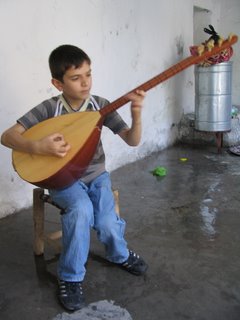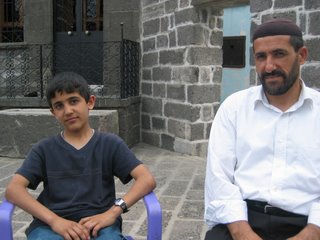“Ne Mutlu Türküm Diyene…”
This phrase, which roughly translates to “how happy I am to call myself a Turk,”is one of the favorite slogans of the Turkish government as well as some Turkish citizens. It is emblazoned on mugs and on walls in buildings. Do an Internet search for this phrase and one finds websites started by Turkish people and others who love Turkey or being Turkish. In the East, around cities such as Diyarbakır and Van, this slogan has been cut into hillsides, visible for miles around.
the Turkish government as well as some Turkish citizens. It is emblazoned on mugs and on walls in buildings. Do an Internet search for this phrase and one finds websites started by Turkish people and others who love Turkey or being Turkish. In the East, around cities such as Diyarbakır and Van, this slogan has been cut into hillsides, visible for miles around.
(This photo is of a Kurdish boy playing the saz. His father is in jail, though I don't know why.)
The interesting part about the latter point is that this exuberant statement of national pride occurs in areas where ethnic Turks are likely a minority. In fact, it seems that Atatürk’s policy of creating a Turk identity where there was none before (previously all had been Ottoman) is unraveling.
The most notable ethnic group living within Turkey is the Kurds, who are a majority throughout much of Turkey’s Southeast, but a large minority in Istanbul. It is not unlikely for a waiter, carpet salesman, or shop owner answer to the question of “where are you from?” with “I am Kurdish.” In Van it seems that everyone is Kurdish, and while Turkish language is written everywhere, it is often that one hears Kurdish spoken. I spent one interesting evening with the contractor in charge of reconstruction of the Armenian Church on Akdamar Island near Van, Turkey. He and his colleague are also Kurdish and proceeded to play Kurdish music (on their cell phones, no less) all evening. They said that they speak Kurdish at home with their families.
(A Syrian priest and his son. They speak Aramaic in their home.)

Kurdish isn’t the only “foreign” language spoken in the Southeast. One is also likely to hear Arabic, especially as one nears the borders of Iraq and Syria. Nor is Arabic the language of the older generation; children are just as likely to speak it. One tobacco-seller said that his family is Syrian by recent ancestry. Others who are Syrian by ancestry are Syrian Christians, some of whom are learning or speaking Aramaic. For a list of many of the languages spoken in Turkey (incomplete, however, for it does not include Armenian, Aramaic, and probably a few others), check this website.
Given that Turkey has Turkish-Armenians, -Bulgarians, -Jews, -Kurds, -Syrians and others, Turkey’s policy of “Turkishness” seems dated, and it appears that many in the population agree. In my opinion, one of Turkey’s biggest challenges in the next decade or two will be to accept the notion that one can be both a Turkish citizen and ethnically something else. It is easy for most Americans to accept this notion, as from birth the U.S. was intended as a new home for immigrants. However, in Turkey the concept of “one Turk” gives legitimacy to borders that were wrought out of war, falsely establishing an historic Turkish homeland. In truth, the nation of Turkey encompasses a multi-cultural region rich in ancient languages and cultures. In my opinion, the sooner the Turkish government recognizes this and develops policies to encourage and protect these traditions, the sooner Turkey will become a thriving and integrated nation.
to borders that were wrought out of war, falsely establishing an historic Turkish homeland. In truth, the nation of Turkey encompasses a multi-cultural region rich in ancient languages and cultures. In my opinion, the sooner the Turkish government recognizes this and develops policies to encourage and protect these traditions, the sooner Turkey will become a thriving and integrated nation.
 the Turkish government as well as some Turkish citizens. It is emblazoned on mugs and on walls in buildings. Do an Internet search for this phrase and one finds websites started by Turkish people and others who love Turkey or being Turkish. In the East, around cities such as Diyarbakır and Van, this slogan has been cut into hillsides, visible for miles around.
the Turkish government as well as some Turkish citizens. It is emblazoned on mugs and on walls in buildings. Do an Internet search for this phrase and one finds websites started by Turkish people and others who love Turkey or being Turkish. In the East, around cities such as Diyarbakır and Van, this slogan has been cut into hillsides, visible for miles around. (This photo is of a Kurdish boy playing the saz. His father is in jail, though I don't know why.)
The interesting part about the latter point is that this exuberant statement of national pride occurs in areas where ethnic Turks are likely a minority. In fact, it seems that Atatürk’s policy of creating a Turk identity where there was none before (previously all had been Ottoman) is unraveling.
The most notable ethnic group living within Turkey is the Kurds, who are a majority throughout much of Turkey’s Southeast, but a large minority in Istanbul. It is not unlikely for a waiter, carpet salesman, or shop owner answer to the question of “where are you from?” with “I am Kurdish.” In Van it seems that everyone is Kurdish, and while Turkish language is written everywhere, it is often that one hears Kurdish spoken. I spent one interesting evening with the contractor in charge of reconstruction of the Armenian Church on Akdamar Island near Van, Turkey. He and his colleague are also Kurdish and proceeded to play Kurdish music (on their cell phones, no less) all evening. They said that they speak Kurdish at home with their families.
(A Syrian priest and his son. They speak Aramaic in their home.)

Kurdish isn’t the only “foreign” language spoken in the Southeast. One is also likely to hear Arabic, especially as one nears the borders of Iraq and Syria. Nor is Arabic the language of the older generation; children are just as likely to speak it. One tobacco-seller said that his family is Syrian by recent ancestry. Others who are Syrian by ancestry are Syrian Christians, some of whom are learning or speaking Aramaic. For a list of many of the languages spoken in Turkey (incomplete, however, for it does not include Armenian, Aramaic, and probably a few others), check this website.
Given that Turkey has Turkish-Armenians, -Bulgarians, -Jews, -Kurds, -Syrians and others, Turkey’s policy of “Turkishness” seems dated, and it appears that many in the population agree. In my opinion, one of Turkey’s biggest challenges in the next decade or two will be to accept the notion that one can be both a Turkish citizen and ethnically something else. It is easy for most Americans to accept this notion, as from birth the U.S. was intended as a new home for immigrants. However, in Turkey the concept of “one Turk” gives legitimacy
 to borders that were wrought out of war, falsely establishing an historic Turkish homeland. In truth, the nation of Turkey encompasses a multi-cultural region rich in ancient languages and cultures. In my opinion, the sooner the Turkish government recognizes this and develops policies to encourage and protect these traditions, the sooner Turkey will become a thriving and integrated nation.
to borders that were wrought out of war, falsely establishing an historic Turkish homeland. In truth, the nation of Turkey encompasses a multi-cultural region rich in ancient languages and cultures. In my opinion, the sooner the Turkish government recognizes this and develops policies to encourage and protect these traditions, the sooner Turkey will become a thriving and integrated nation.

0 Comments:
Post a Comment
<< Home